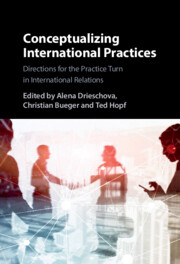Book contents
- Conceptualizing International Practices
- Conceptualizing International Practices
- Copyright page
- Contents
- Figures
- Table
- Contributors
- Acknowledgements
- Part I Introduction: Conversations and the Evolution of Practice Theorizing
- 1 Conceptualizing International Practices
- 2 Critiques of the Practice Turn in IR Theory
- Part II Key Concepts of IR Scholarship
- Part III Innovative Concepts
- Part IV Conclusion: The Future of Practice Theorizing
- References
- Index
1 - Conceptualizing International Practices
Establishing a Research Agenda in Conversations
from Part I - Introduction: Conversations and the Evolution of Practice Theorizing
Published online by Cambridge University Press: 09 June 2022
- Conceptualizing International Practices
- Conceptualizing International Practices
- Copyright page
- Contents
- Figures
- Table
- Contributors
- Acknowledgements
- Part I Introduction: Conversations and the Evolution of Practice Theorizing
- 1 Conceptualizing International Practices
- 2 Critiques of the Practice Turn in IR Theory
- Part II Key Concepts of IR Scholarship
- Part III Innovative Concepts
- Part IV Conclusion: The Future of Practice Theorizing
- References
- Index
Summary
The Introduction first highlights the value added of practice approaches to international relations, and demonstrates how a practice perspective differs from other IR theoretical approaches. The chapter then offers a contextualization of practice theories in IR through a historical discussion that highlights the foundations of practice theoretical thought, its connections to, and shared assumptions with preceding IR scholarship, but also the ways in which it fundamentally differs from other theoretical approaches. With this narrative we respond to some allegations and misunderstandings within the discipline that the practice talk is plainly a reinvigoration of old ideas, that there is little new about practice approaches, or that they present us with a new version of constructivism. Third, we proceed in discussing the scope and contours of practice-driven research by discussing how the practice debate might be ordered. Arguing against pitching discrete practice approaches against each other, we draw attention to a number of fault lines that run through the practice debate, such as stability and change. We then showcase how each chapter in this volume engages with broader IR scholarship, and how it provides a new practice-driven vista on relevant IR questions.
Keywords
- Type
- Chapter
- Information
- Conceptualizing International PracticesDirections for the Practice Turn in International Relations, pp. 3 - 27Publisher: Cambridge University PressPrint publication year: 2022
- 2
- Cited by



